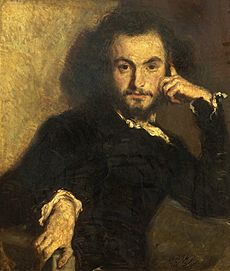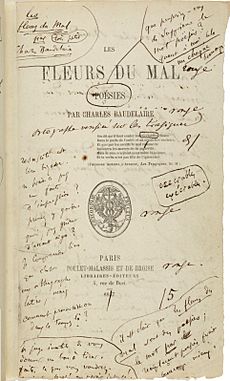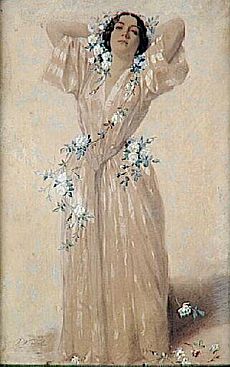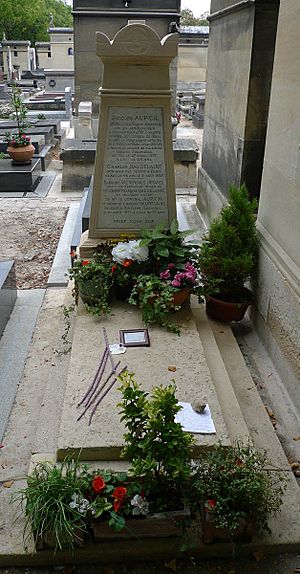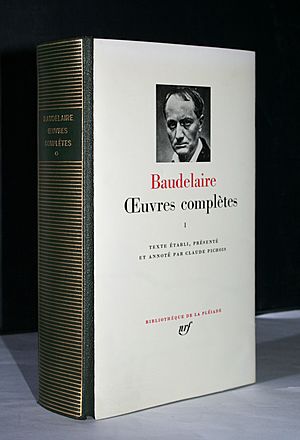Charles Baudelaire facts for kids
Quick facts for kids
Charles Baudelaire
|
|
|---|---|
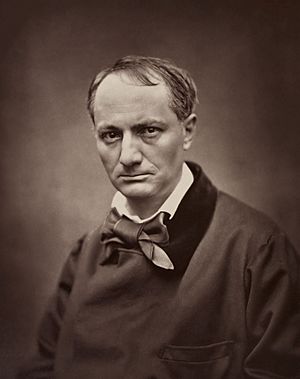
Charles Baudelaire by Étienne Carjat, 1863
|
|
| Born | Charles Pierre Baudelaire 9 April 1821 Paris, France |
| Died | 31 August 1867 (aged 46) Paris, France |
| Occupation | Poet, art critic, philosopher |
| Education | Lycée Louis-le-Grand |
| Period | 1844–1866 |
| Literary movement | Decadent |
| Signature | |
Charles Pierre Baudelaire (9 April 1821 – 31 August 1867) was a famous French poet. He also worked as an essayist, art critic, and translator.
Baudelaire is best known for his book of poems, Les Fleurs du mal (The Flowers of Evil), published in 1857. He was born in Paris, France. He studied law at the Lycée Louis-le-Grand in Paris. His first published work was an art review called Salon of 1845.
Contents
Charles Baudelaire's Early Life
Charles Baudelaire was born in Paris, France, on April 9, 1821. His father, Joseph-François Baudelaire, was a government worker and artist. He was much older than Charles's mother, Caroline. Charles's father died when Charles was young, in 1827.
The next year, his mother married Lieutenant Colonel Jacques Aupick. He later became a French ambassador. Some people believe this change affected Charles deeply. He was no longer the only focus of his mother's love.
Baudelaire went to school in Lyon, where he lived away from home. At 14, a classmate described him as very refined. He was more distinguished than other students. They shared a love for great literature. Charles's studies were not always steady. Sometimes he worked hard, but other times he was idle.
Later, he attended the Lycée Louis-le-Grand in Paris. He studied law there. This was a common choice for students unsure of their career. He started to get into debt, mostly for clothes. In 1839, he earned his degree. He told his brother he didn't feel a calling for anything.
His stepfather wanted him to work in law or diplomacy. But Charles decided to become a writer instead. His mother later said she wished he had followed his stepfather's advice. She believed they would have been happier.
In 1841, his stepfather sent him on a trip to Calcutta, India. This was to help him change some habits. The journey gave him strong memories of the sea and exotic places. He later used these memories in his poems. When he returned to Paris, he began writing poems for Les Fleurs du Mal.
At 21, he received a large inheritance. He spent most of it within a few years. His family then had his property placed in a trust. This meant he could not control his own money. He was very unhappy about this decision.
Baudelaire became known in art circles. He was seen as a stylish person who spent money freely. He used up much of his inheritance quickly.
He took part in the French Revolution of 1848. He also wrote for a revolutionary newspaper. However, his interest in politics did not last long.
In the early 1850s, Baudelaire faced challenges. He had health issues and owed money. He often moved to avoid people he owed money to. He started many projects but could not finish them all. However, he did complete many translations of stories by Edgar Allan Poe.
When his stepfather died in 1857, Charles did not receive anything in the will. But he felt hopeful that he could improve his relationship with his mother. At 36, he wrote to her, saying he belonged to her completely. His mother passed away in 1871, almost four years after him.
Baudelaire's Publishing Career
Baudelaire's first published work was an art review. It was called "Salon of 1845". He used the name Baudelaire Dufaÿs. This review quickly gained attention because it was very bold.
In 1846, he wrote another Salon review. This helped him become a respected critic of Romanticism. He continued to support Eugène Delacroix as a leading Romantic artist. This support was widely noticed. The next year, Baudelaire's short novel La Fanfarlo was published.
The Flowers of Evil Poems
Baudelaire worked slowly and carefully on his writing. However, he was often sidetracked. He faced laziness, emotional difficulties, and illness. It was not until 1857 that he published Les Fleurs du mal (The Flowers of Evil). This was his first and most famous book of poems.
The poems found a small but appreciative audience. The famous writer Victor Hugo wrote to Baudelaire. He said, "Your fleurs du mal shine and dazzle like stars." He greatly praised Baudelaire's strong spirit.
Baudelaire's Final Years

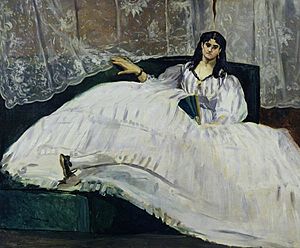
By 1859, his health and the stress of his life had affected him. Baudelaire looked much older. Finally, his mother agreed to let him live with her. They stayed for a while in Honfleur, a seaside town. Baudelaire was productive and peaceful there. His poem Le Voyage is an example of his work from that time. In 1860, he became a strong supporter of Richard Wagner.
His money problems grew worse. This happened especially after his publisher went bankrupt in 1861. In 1864, he left Paris for Belgium. He hoped to sell the rights to his works and give lectures. His long friendship with Jeanne Duval continued. He supported her until the end of his life.
Baudelaire became very ill in 1866. He could not move parts of his body. After more than a year of difficulty speaking, he received religious rites. The last two years of his life were spent in care homes. He was in Brussels and Paris. He died on August 31, 1867. Baudelaire is buried in the Cimetière du Montparnasse in Paris.
Many of Baudelaire's works were published after his death. His mother paid off his large debts. She found comfort in her son's growing fame. She said, "I see that my son, for all his faults, has his place in literature." She lived for four more years.
Baudelaire and Edgar Allan Poe
In 1847, Baudelaire discovered the writings of Edgar Allan Poe. He felt that Poe's stories and poems were ideas he had always had in his own mind. Baudelaire saw Poe as a writer who came before him. He tried to be Poe's French equal in his own time.
From 1847 until 1865, he mostly worked on translating Poe's works. His translations were highly praised. Baudelaire was not the first French translator of Poe. But his careful translations were considered among the best.
These translations were published as:
- Histoires extraordinaires (Extraordinary stories) (1856)
- Nouvelles histoires extraordinaires (New extraordinary stories) (1857)
- Aventures d'Arthur Gordon Pym
- Eureka
- Histoires grotesques et sérieuses (Grotesque and serious stories) (1865)
He also wrote two essays about Poe. These can be found in his Œuvres complètes (Complete works).
Baudelaire's Influence and Legacy
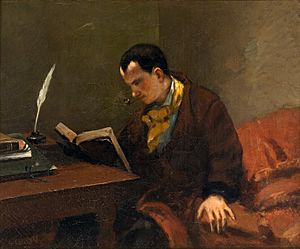
Baudelaire had a big impact on modern French literature. He also influenced English literature. Important French writers who came after him praised him. Four years after Baudelaire's death, Arthur Rimbaud called him "the king of poets, a true God."
In 1895, Stéphane Mallarmé wrote a sonnet in Baudelaire's memory. It was called "Le Tombeau de Charles Baudelaire." Marcel Proust wrote an essay in 1922. He said Baudelaire was "the greatest poet of the nineteenth century." He put him alongside Alfred de Vigny.
In English-speaking countries, Edmund Wilson said Baudelaire helped start the Symbolist movement. He did this through his translations of Poe. In 1930, T. S. Eliot said Baudelaire had "great genius." He also said Baudelaire's "technical mastery" was amazing. This made his poems a great study for later poets.
Major Works by Baudelaire
- Salon de 1845, 1845
- Salon de 1846, 1846
- La Fanfarlo, 1847
- Les Fleurs du mal, 1857
- Les paradis artificiels, 1860
- Réflexions sur Quelques-uns de mes Contemporains, 1861
- Le Peintre de la Vie Moderne, 1863
- Curiosités Esthétiques, 1868
- L'art romantique, 1868
- Le Spleen de Paris, 1869. Also known as Paris Spleen.
- Translations from Charles Baudelaire, 1869 (Early English translation of some poems)
- Oeuvres Posthumes et Correspondance Générale, 1887–1907
- Fusées, 1897
- Mon Coeur Mis à Nu, 1897. Also known as My Heart Laid Bare & Other Texts.
- Oeuvres Complètes, 1922–53 (19 volumes)
- Mirror of Art, 1955
- The Essence of Laughter, 1956
- Curiosités Esthétiques, 1962
- The Painter of Modern Life and Other Essays, 1964
- Baudelaire as a Literary Critic, 1964
- Arts in Paris 1845–1862, 1965
- Selected Writings on Art and Artists, 1972
- Selected Letters of Charles Baudelaire, 1986
- Twenty Prose Poems, 1988
- Critique d'art; Critique musicale, 1992
- Belgium Stripped Bare (2019)
Images for kids
-
Illustration cover for Les Épaves, by Baudelaire's friend Félicien Rops
See also
 In Spanish: Charles Baudelaire para niños
In Spanish: Charles Baudelaire para niños
 | Janet Taylor Pickett |
 | Synthia Saint James |
 | Howardena Pindell |
 | Faith Ringgold |


